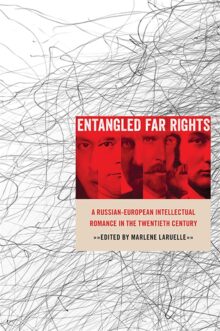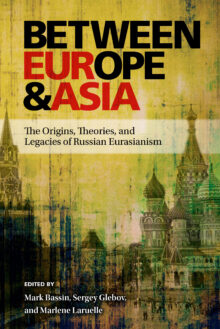
Marlene Laruelle
Marlene Laruelle, Ph.D., is an Associate Director and Research Professor at the Institute for European, Russian and Eurasian Studies (IERES), Elliott School of International Affairs at the George Washington University. She is also a Co-Director of the Program on New Approaches to Research and Security in Eurasia (PONARS Eurasia) and Director of George Washington University’s Central Asia Program.
Entangled Far Rights
A Russian-European Intellectual Romance in the Twentieth Century
Since the Ukrainian crisis in 2014, Russia’s support to the European far right—and to a variety of populist leaders more globally—has become a cornerstone of the West’s perception of Moscow as a “spoiler” on the international scene. The fact that Russia’s most fervent supporters are now to be found on the right of the ideological spectrum should not be a surprise. The European far right has always had Russophile tendencies, but these were obscured during the Cold War, when rightist politics were most of all anti-Communist. Entangled Far Rights traces the “intellectual romance” that existed between European far right groups and their Russian-Soviet counterparts during the twentieth century and accounts for their recent re-emergence.
Between Europe and Asia
The Origins, Theories, and Legacies of Russian Eurasianism
Between Europe and Asia analyzes the origins and development of Eurasianism, an intellectual movement that proclaimed the existence of Eurasia, a separate civilization coinciding with the former Russian Empire. The essays in the volume explore the historical roots, the heyday of the movement in the 1920s, and the afterlife of the movement in the Soviet and post-Soviet periods. The first study to offer a multifaceted account of Eurasianism in the twentieth century and to touch on the movement’s intellectual entanglements with history, politics, literature, or geography, this book also explores Eurasianism’s influences beyond Russia.
The Eurasianists blended their search for a primordial essence of Russian culture with radicalism of Europe’s interwar period. In reaction to the devastation and dislocation of the wars and revolutions, they celebrated the Orthodox Church and the Asian connections of Russian culture, while rejecting Western individualism and democracy. The movement sought to articulate a non-European, non-Western modernity, and to underscore Russia’s role in the colonial world. As the authors demonstrate, Eurasianism was akin to many fascist movements in interwar Europe, and became one of the sources of the rhetoric of nationalist mobilization in Vladimir Putin’s Russia. This book presents the rich history of the concept of Eurasianism, and how it developed over time to achieve its present form.


